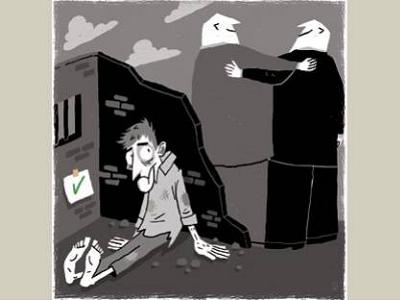Reality of Hamas-Fatah Unity

The chasm has never been so wide. (Gulf News/Luiz Vazquez)
By Ramzy Baroud, Special to Gulf News
While top officials representing rival Palestinian factions, Hamas and Fatah, signed yet another unity agreement on February 6 in Doha, Qatar, Palestinian prisoner Khader Adnan crossed the 50-day mark of his hunger strike. His health was rapidly deteriorating.
Since his arrest on December 17, “Khader was subjected to degrading and inhuman treatment, including physical abuse, prolonged periods of interrogation, isolation and unsanitary conditions of detention,” according to a joint statement by the Palestinian Council of Human Rights Organisations (PCHRO), an umbrella group that represents all major Palestinian human rights groups.
After a medical examination on January 29, doctors representing Physicians for Human Rights — Israel concluded that Adnan’s life was at risk. By then, he had lost over 20 kilograms. Israel’s system of administration detention can hold detainees ad infinitum, without trial or due process per orders of a military court. After a recent review of his case, military judge Dalya Kaufman decided that despite all medical claims to the contrary, Khader’s condition was “acceptable”.
Khader’s case highlights the unparalleled chasm separating Palestinian leaders from the everyday issues and struggles of Palestinians in the Occupied Territories. These include: military occupation, dwindling water resources, an almost entirely dependent economy, festering corruption and ongoing violence of the colonists. Despite this reality, the people who are supposed to represent Palestinians seem entirely consumed by strange priorities, futile ‘peace’ and power-sharing ‘unity’ agreements.
Palestinians have been trapped in this odd reality ever since Fatah and Palestinian Liberation Organisation leaders agreed to sign a ‘peace accord’ with Israel without consulting with the Palestinian people in 1993. By singing a unity agreement with Fatah, Hamas, which has long championed the ‘choice of resistance’, is now tacitly joining the political charade which pushed Palestinians to the brink and ignited the Second Palestinian Intifada in 2000.
The Qatar-brokered ‘breakthrough unity deal’ between Hamas’ leader Khalid Mesha’al and Palestinian National Authority (PNA) President Mahmoud Abbas has resolved that the latter will also head an interim unity government in preparation for elections. Abbas, 76, already possesses several impressive titles, but hardly has the qualities to lead Palestinians through a political quagmire that he largely orchestrated.
Since becoming PNA president in January 2005, Abbas has sold false hopes while simultaneously damaging any means of their realisation. Recent examples are summarised by news report titles such as these in Israel’s Haaretz newspaper: ‘Abbas: Jordan talks ‘revive hopes of Israeli-Palestinian negotiations’ (January 25) and ‘Abbas: Israel to blame for failed peace talks in Jordan’ (January 29).
Since its formal establishment in 1994, the PNA provided a platform for corrupt individuals to exploit a corruptible institution which was far from being a national liberation project. The PNA had, in fact, institutionalised corruption. More, it divided and devastated Palestinian society, squandering years of the societal cohesion during the early phases of the First Intifada.
The once commonly used nationalist language, which had long unified ordinary Palestinians, was replaced with new terminology: contracts, aid, NGOs, connections, VIP cards (which provided freedom of movement to those who didn’t constitute security risks for Israel, i.e. the pro-Oslo crowd) and so on.
As a new ‘pragmatic’ culture was ushered in, the multitudes that rejected Oslo’s corrupt elite was swallowed by confusion. In the pre-Oslo years, Palestinians had an unmistakable enemy. After Oslo, the enemies were harder to define. Those with flexible morality became the movers and shakers of the newly ‘liberated’ society which was actually still captive.
The rise of Hamas as a leading faction in the Palestinian opposition to Oslo was very much attributed to this phase. The Palestinian leadership was seen to have lost every facet of moral and political accountability. The movement was not venerated for lobbing homemade rockets at Israel, or even for its religious leanings, but for the political ideals it was believed to represent.
Much has changed since then — certainly enough to divert Hamas from an inclusive national project to what are clearly becoming exclusive factional priorities. Some of its officials now speak the very language that their Fatah rivals once spoke as they attempted to sell a self-serving political swindle as a national victory.
Fatah had then justified the wholesale slaughter of what has been termed a ‘Palestinian national project’ by regional and international political necessities. Now, similar analysis is being offered regarding the political shifts in Hamas’ attitude due to the violence in Syria, the growing isolation of Iran, the rise of Islamists in various Arab countries, and the active role played by some Gulf countries in managing post ‘Arab Spring’ reality.
Salman Shaikh, director of The Brookings Doha Centre in Qatar, described the shift in Hamas as a move “into the Arab orbit”. He said: “This is one of the significant achievements of the Arab Spring and a reflection of how Gulf power has grown.” However, no achievement of the so-called Arab Spring and no Gulf power can have much of a bearing on Palestinian reality without a self-possessed, truly representative Palestinian leadership — one that is neither fishing for money nor political favours.
Ultimately, Hamas-Fatah unity based on halving the spoils of whatever imagined power they may have over occupied and oppressed people will in no significant way alter the fate of hunger-striker Adnan. Neither will it reclaim one inch of the Occupied Territories, or revive the long-dormant Palestinian national project around new, truly unifying and all-encompassing priorities.
Frankly it is absurd to witness Palestinian factions lobbying among and seeking exclusive approval, funding and backing of countries near and far, while millions of Palestinians carry on facing the reality of sieges, walls, barbed wires and machine guns.
Truly, the chasm has never been so wide.
– Ramzy Baroud (www.ramzybaroud.net) is an internationally-syndicated columnist and the editor of PalestineChronicle.com. His latest book is My Father Was a Freedom Fighter: Gaza’s Untold Story (Pluto Press, London).










































0 Comments